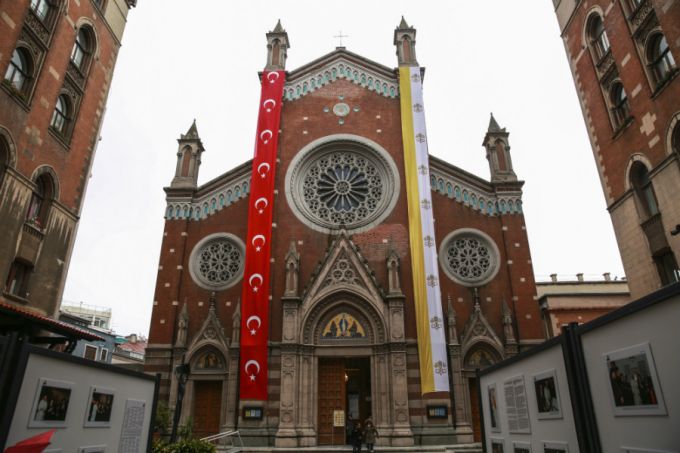
By Marta Jiménez
.- Living as a Catholic in the majority Muslim country of Turkey can be difficult, but it can also be a blessing and a call to witness, says Mexican priest Father Ruben Tierrablanca Gonzalez. A Franciscan friar who has served for 11 years at St. Mary Draperis Parish in Istanbul, Fr. Tierrablanca spoke with CNA Nov. 27. “Living as a Christian in Turkey is a huge challenge and a grace,” Fr. Tierrablanca said. “A grace because we live where the Church has its roots and the presence of Christians is important, since God himself wanted his Church to expand here. And a challenge because it has become de-Christianized, in terms of population. We are very few.”
“We are a minority within a religious minority,” the priest explained. “Of the 100,000 Christians in Turkey, 65 percent are Armenians and Catholics number only 25,000.” Christians came to Turkey 2,000 years ago, centuries before the birth of Islam. The early Christian communities in Asia Minor were founded largely as the result of St. John’s preaching in Ephesus, St. Philip’s in Hierapolis, and St. Andrew, who is considered the evangelizer of the region. Today, however, Christians are the minority in Turkey, where some 98 percent of the country is Muslim.
A priest for 34 years, Fr. Tierrablanca is currently the director of fraternity of the Friars Minor in Istanbul, where they work for ecumenical and inter-religious dialogue. “The relations with Christians of the Eastern Churches are very good and continue to improve. We need to create trust and friendship between us, we need to create unity in the faith,” he said. Since 2003, the Franciscans have been seeking to foster dialogue in the area. Each year they celebrate a two-day long symposium on common issues between the different religions. “We are all seeking after God,” Fr. Tierrablanca said. The Mexican priest said Christians in Turkey “are called to be authentic and credible witnesses.”
“When there is this diversity of religions, what does our own say to others and to the world? Living the Christian faith amidst Muslims demands a purification of the faith, a maturity and openness to others, to live an authentically evangelical Christian life,” he reflected.
“We are called to this and we try to be creative in responding to this challenge. If we are to be in contact with Muslims, we have to show them a Christian witness, and that helps us to be better Christians and to grow in our faith.”
Regarding the question of how Christians should confront the threat of Islamic terrorism, Fr. Tierrablanca was clear: “With life. What can we do? Live our Christian lives. If we show signs of openness, friendship, relationships with our brothers – we should call them brothers because they are children of the same God – we encounter kindness. We offer them our friendship, they offer us theirs, and together we walk. That is a challenge but also a grace to have good Muslim friends and to be able to say, ‘It is possible’.”
Voicing gratitude for Pope Francis’ visit to Turkey at the end of November, Fr. Tierrablanca said that relations with Muslims “can change, but we should not expect an immediate result.”
The Holy Father “confirms us in our faith as pastor and he inspires us to remain hopeful,” he added.
The priest voiced hope that “Christians in Turkey with Muslims can give an example that peaceful coexistence among religions is possible.”



